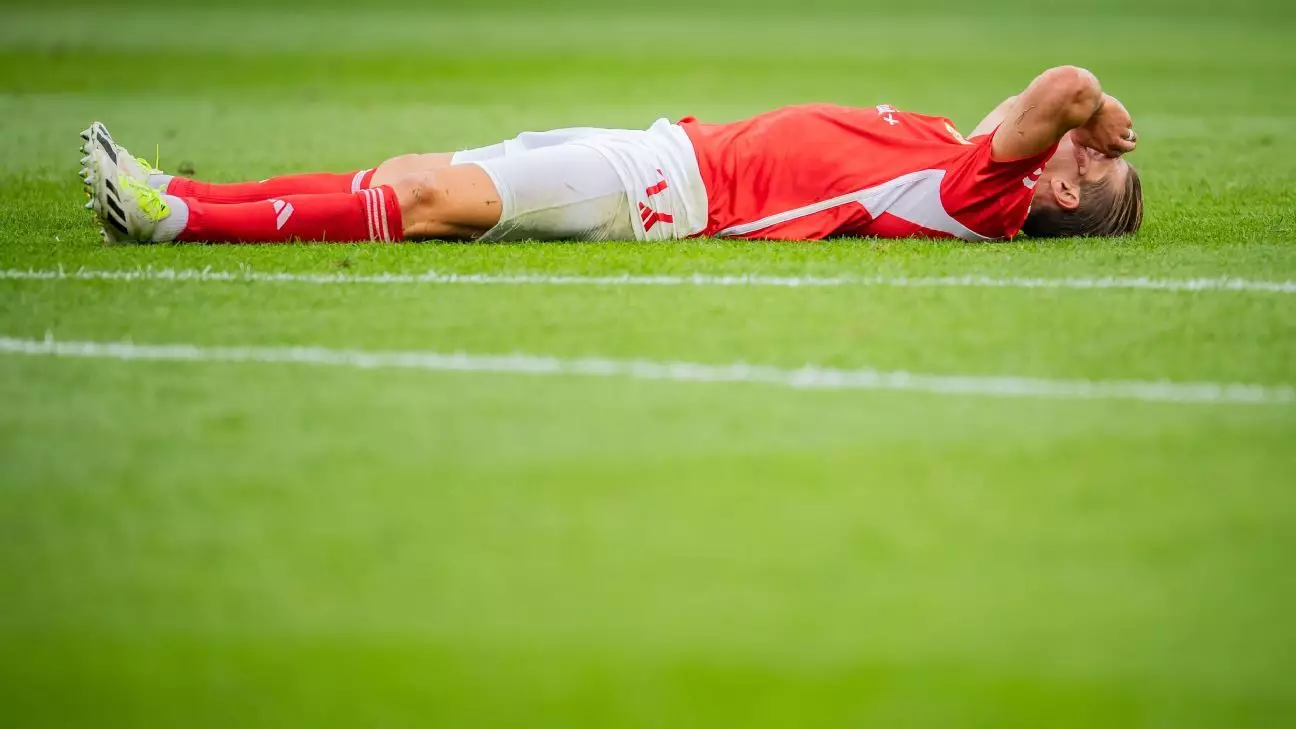In a momentary ray of hope, Union Berlin’s fans dared to dream during their final Champions League group stage game against Real Madrid. Czech midfielder Alex Král scored a late equalizer, igniting the hopes of the 70,000 fans in attendance. Unfortunately, Dani Ceballos shattered Union’s dreams with a last-minute goal, leaving the Berlin-based team empty-handed once again. Despite the disappointment, the supporters remained supportive, recognizing the small margins that separate success from failure at the highest level.
A Crushing Reality Check
Union Berlin’s early exit from the Champions League may not be catastrophic, but it symbolizes a significant shift in the club’s fortunes. Merely six months ago, the team and their coach Urs Fischer were basking in the glory of a fourth-place finish in the Bundesliga. The future looked incredibly promising for the club. Fischer’s tactical acumen and the team’s consistent performance seemed to herald a new era of success.
However, fate had a different trajectory in store for Union Berlin. A dreadful 14-game winless streak, including 12 consecutive losses, not only forced Fischer to resign but also raised questions about the sustainability of Union’s recent achievements. Fischer’s departure was a blow to the club, as he had been the driving force behind their rise from a second-division team to Bundesliga contenders. His departure signaled a sudden halt to Union’s upward trajectory.
Union Berlin’s ambitions started to soar as the team made high-profile signings, including Leonardo Bonucci from Juventus and German international Robin Gosens. The club’s vision expanded, and they yearned for more than just a status as an underdog. They craved a place among the elites of German football. The pursuit of Isco, the former Real Madrid star, showcased their newfound aspirations. Though Isco ultimately did not sign a contract, Union’s intentions were clear – they were ready to compete for marquee names.
The arrival of renowned players like Bonucci and Gosens seemed to usher in a new era at Union Berlin. The Alte Försterei, their home ground, was becoming increasingly ambitious. However, the promising changes that were expected didn’t materialize. Instead, Union faced a harsh reality check, culminating in Fischer’s departure.
Following Fischer’s exit, Union Berlin was briefly connected with the legendary Raúl Gonzalez as a potential replacement. However, Gonzalez chose to remain at Real Madrid Castilla, and Union opted for a more conventional choice, Nenad Bjelica. The Croatian manager, although not widely discussed in Bundesliga circles, brought a wealth of experience and success from his previous coaching roles.
Bjelica’s appointment marked a departure from Fischer’s distinct playing style. Rather than adhering to a specific tactical approach, Bjelica relied on his exceptional man-management skills. He aimed to reignite passion and self-belief within the team, whose confidence had diminished during the troubling period towards the end of Fischer’s tenure. Union Berlin needed a leader who could not only address tactical weaknesses but also rejuvenate the players’ mindset.
Bjelica’s first significant test as Union Berlin’s manager came in the form of an away Champions League tie against Braga. He deviated from Fischer’s tactics, implementing a back four and leaving Bonucci on the bench. The match demonstrated that Union remained a reactive side, waiting for the perfect moment to strike. Despite taking the lead and having the numerical advantage due to a red card for Braga, Union failed to capitalize and conceded shortly after halftime. Bjelica’s appointment seemed justified as his team’s performance showed signs of improvement.
The breakthrough finally arrived when Union Berlin defeated Borussia Mönchengladbach, ending a 16-game winless streak in all competitions. The team’s performance was described by Bjelica as “practically perfect.” The victory injected a much-needed boost of positive energy into the club, rejuvenating the players and fans alike.
While the win over Gladbach offered a glimmer of hope, Union Berlin could not rest on their laurels. They still found themselves precariously close to the relegation zone. Bjelica faced the daunting task of securing vital points to create a gap between Union and the relegation battle. Furthermore, he had to navigate the complexities of managing a diverse dressing room filled with both hungry up-and-comers and battle-hardened veterans unaccustomed to the fight for survival.
The current situation is far from what Union Berlin had envisioned for the season. The club’s rapid ascent to the pinnacle of German football was matched only by their sudden descent. The departure of Fischer and subsequent struggles underscored the volatile nature of the sport. Union Berlin’s success story had hit a roadblock, and Bjelica’s appointment marked a new chapter in their quest for stability and prosperity.
Times have changed for Union Berlin. The once unstoppable force in the Bundesliga found themselves adrift, searching for answers. The arrival of Bjelica offered a glimmer of hope, a chance for redemption. His ability to rekindle the team’s fighting spirit and instill confidence will be crucial in navigating Union Berlin to safer waters. With each game, the team must show resilience, determination, and a relentless pursuit of victory. As the season progresses, Union Berlin must adapt to the changing tides and emerge stronger than ever before.
